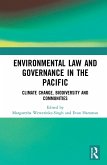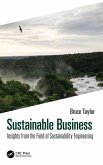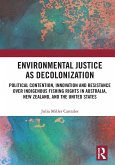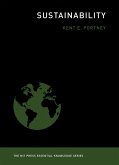Climate, Science and Society
A Primer
Herausgegeben:Baker, Zeke; Law, Tamar; Vardy, Mark; Zehr, Stephen
Climate, Science and Society
A Primer
Herausgegeben:Baker, Zeke; Law, Tamar; Vardy, Mark; Zehr, Stephen
- Broschiertes Buch
- Merkliste
- Auf die Merkliste
- Bewerten Bewerten
- Teilen
- Produkt teilen
- Produkterinnerung
- Produkterinnerung
Climate, Science and Society: A Primer makes cutting-edge research on climate change accessible to student readers.
The primer consists of 37 short chapters organized within 11 parts written by Science and Technology Studies (STS) and other social science scholars. It covers a range of key topics including communication, justice and inequality, climate policy, and energy transitions, situating each one within the context of STS studies. Each reading translates a focused area of climate change research into short, accessible, and lively prose. Chapter authors open debates where relevant,…mehr
Andere Kunden interessierten sich auch für
![Environmental Law and Governance in the Pacific Environmental Law and Governance in the Pacific]() Environmental Law and Governance in the Pacific45,99 €
Environmental Law and Governance in the Pacific45,99 €![The European Union and Global Environmental Protection The European Union and Global Environmental Protection]() The European Union and Global Environmental Protection45,99 €
The European Union and Global Environmental Protection45,99 €![Sustainable Business Sustainable Business]() Bruce TaylorSustainable Business113,99 €
Bruce TaylorSustainable Business113,99 €![Environmental Justice as Decolonization Environmental Justice as Decolonization]() Julia Miller CantzlerEnvironmental Justice as Decolonization42,99 €
Julia Miller CantzlerEnvironmental Justice as Decolonization42,99 €![Environmental Justice in Early Victorian Literature Environmental Justice in Early Victorian Literature]() Adrian TaitEnvironmental Justice in Early Victorian Literature142,99 €
Adrian TaitEnvironmental Justice in Early Victorian Literature142,99 €![Carbon Capture Carbon Capture]() Howard J. Herzog (Massachusetts Institute Senior Research EngineerCarbon Capture11,99 €
Howard J. Herzog (Massachusetts Institute Senior Research EngineerCarbon Capture11,99 €![Sustainability Sustainability]() Kent E. Portney (Department of Political Science)Sustainability22,99 €
Kent E. Portney (Department of Political Science)Sustainability22,99 €-
-
-
Climate, Science and Society: A Primer makes cutting-edge research on climate change accessible to student readers.
The primer consists of 37 short chapters organized within 11 parts written by Science and Technology Studies (STS) and other social science scholars. It covers a range of key topics including communication, justice and inequality, climate policy, and energy transitions, situating each one within the context of STS studies. Each reading translates a focused area of climate change research into short, accessible, and lively prose. Chapter authors open debates where relevant, consider policy implications, critique existing areas of research, and otherwise situate their reading within a larger body of research relevant to climate change courses.
Designed as a jumping-off point for further exploration, this innovative book will be essential reading for students studying climate change, STS, environmental sociology, and environmental sciences.
TheOpen Access version of this book, available at www.taylorfrancis.com, has been made available under a Creative Commons Attribution-Non Commercial-No Derivatives 4.0 license.
The primer consists of 37 short chapters organized within 11 parts written by Science and Technology Studies (STS) and other social science scholars. It covers a range of key topics including communication, justice and inequality, climate policy, and energy transitions, situating each one within the context of STS studies. Each reading translates a focused area of climate change research into short, accessible, and lively prose. Chapter authors open debates where relevant, consider policy implications, critique existing areas of research, and otherwise situate their reading within a larger body of research relevant to climate change courses.
Designed as a jumping-off point for further exploration, this innovative book will be essential reading for students studying climate change, STS, environmental sociology, and environmental sciences.
TheOpen Access version of this book, available at www.taylorfrancis.com, has been made available under a Creative Commons Attribution-Non Commercial-No Derivatives 4.0 license.
Produktdetails
- Produktdetails
- Verlag: Routledge / Taylor & Francis / University of Southern Indiana
- Seitenzahl: 344
- Erscheinungstermin: 13. Dezember 2023
- Englisch
- Abmessung: 246mm x 174mm x 19mm
- Gewicht: 613g
- ISBN-13: 9781032530178
- ISBN-10: 1032530170
- Artikelnr.: 69033408
- Herstellerkennzeichnung
- Libri GmbH
- Europaallee 1
- 36244 Bad Hersfeld
- gpsr@libri.de
- Verlag: Routledge / Taylor & Francis / University of Southern Indiana
- Seitenzahl: 344
- Erscheinungstermin: 13. Dezember 2023
- Englisch
- Abmessung: 246mm x 174mm x 19mm
- Gewicht: 613g
- ISBN-13: 9781032530178
- ISBN-10: 1032530170
- Artikelnr.: 69033408
- Herstellerkennzeichnung
- Libri GmbH
- Europaallee 1
- 36244 Bad Hersfeld
- gpsr@libri.de
Zeke Baker is Assistant Professor of Sociology at Sonoma State University, USA. His research investigates how changes in climate knowledge relate to political dynamics, especially over the historical long term, in the United States and comparative contexts. Tamar Law is a PhD student at Cornell University in Development Studies and holds an MPhil in Human Environmental Geography from the University of Oxford. Her research in the United States and Southeast Asia examines the knowledge and land politics of climate adaptation and mitigation, centering questions of climate justice. Mark Vardy is a faculty member of the Criminology Department at Kwantlen Polytechnic University, Canada. He is interested in drawing from STS to contribute to discussions of climate justice in green criminology. Stephen Zehr is Professor Emeritus of Sociology at the University of Southern Indiana, USA. His past research focused on climate change scientific expertise and its representation in the media. He is currently researching maple syrup producers and their adaptation to technological changes, climate change, and labor supply and allegiances.
Table of Contents
List of Contributors
Acknowledgements
Introduction
Zeke Baker, Tamar Law, Mark Vardy, and Stephen Zehr
PART I: Climate Change Science as a Social Issue: Introduction
Zeke Baker
1: Future Times and Spaces: Tracing Objectivity, Scale, and Politics in the Social Life of Climate Science
Zeke Baker
2: Meteorology, Climate Science, and Empire: Histories and Legacies
Martin Mahony
3: Rethinking Our Histories and Relations with Climate Change
Candis Callison
PART II: Theorizing Climate, Science, and Society: Introduction
Stephen Zehr
4: We Cannot Afford Not to Perform Constructionist Studies of Mainstream Climate Science
Myanna Lahsen
5: Political Economies of Climate Science: Beyond Technological Villains and Scientific Saviors
Zeke Baker
PART III: Media and Public Communication about Climate Change: Introduction
Stephen Zehr
6: Climate Change Communication: Simple, Right?
Stephen Zehr
7: Public Communication and Perceptions of Climate Change in Brazil
Eloisa Beling Loose and Anabela Carvalho
8: News and Social Media Imagery of Climate Change: Analyzing the Role and Impact of Visuals in Public Communication
Mike S. Schäfer and Xiaoyue Yan
PART IV: NGOs, Civil Society, and Social Movements: Introduction
Mark Vardy
9: Non-Governmental Organizations and the Environmental Movement: Challenges in Climate Change Framing
Steven Yearley
10: Expert Activists and NGOs: Understanding and Acting on Global Climate Change
Adam Fleischmann
11: Skirting the Frame: Prepping and the Conservative Politics of Climate Change
Allison Ford
PART V: Climate Justice: Introduction
Tamar Law
12: Postcards from Small Town India: Situated Climate Justice, Science, and Technology
Ankit Bhardwaj
13: Solar Affordances and the Struggle for Climate Justice in Southwest Asia
Kendra Kintzi
14: Upstream Engagement in the Era of Climate Change
Roopali Phadke
15: Climate Justice: Taking Back the Commons
Shangrila Joshi
PART VI: Climate Governance: Introduction
Mark Vardy
16: Climate Change as Ontological Unsettling: A View from the City
Hannah Knox
17: The IPCC as a Body of Expertise
Reiner Grundmann
18: Consensus, National Self-Interest, and the Shaping of Climate Knowledge in IPCC Assessment Processes
Mark Vardy
19: Trust at the Climate Science-Policy Interface
Tiago Ribeiro Duarte
PART VII: Energy, Sustainability, and Sociotechnical Transitions: Introduction
Stephen Zehr
20: Energy Transitions in a World of Polarized Politics
David J. Hess
21: Configuring Markets and Transactions for Energy System Transition: A Role for STS Research
Daniel Breslau
22: The Role of Users in the Energy Transition
Marianne Ryghaug, Tomas Moe Skjølsvold, and Robert Næss
23: STS and the Design of Futures
Clark A. Miller
PART VIII: Climate Change Adaptation and Resilience: Introduction
Tamar Law
24: Climate Change Adaptation and Resilience: Sociotechnical and Knowledge Dimensions
Tim Forsyth
25: Rethinking Climate Change Adaptation
Marcus Taylor
26: Farming in Climate Crisis: Agricultural Adaptation(s) in Central New York State
Tamar Law
27: Climate Adaptation, Methodology, and the Case Study
Sarah E. Vaughn
PART IX: Art, Infrastructure, and Climate: Introduction
Mark Vardy
28: Amphibious Cities
Dominic Boyer
29: Aesthetic Encounters with the More-Than-Human
Désirée Förster
30: Averted Vision
Karolina Sobecka
PART X: Climate Engineering: Introduction
Zeke Baker
31: The Politics of Climate Engineering Research
Julia Schubert
32: The Intervention of Climate Science
Stefan Schäfer
33: Making the 1.5oC Aspirational Climate Target Tangible with Carbon Dioxide Removal and Boundary Work
Anders Hansson
34: Boundary Work in Solar Geoengineering Assessment and Experiments
Sean Low
PART XI: Climate Futures: Introduction
Zeke Baker
35: Futuring in Climate Politics: Activism and the Politics of the Imagination
Jeroen Oomen
36: The World Ocean and Climate Connectivities
Cymene Howe
37: From Controlling Global Mean Temperature to Caring for a Flourishing Climate
Andy Stirling
Index
List of Contributors
Acknowledgements
Introduction
Zeke Baker, Tamar Law, Mark Vardy, and Stephen Zehr
PART I: Climate Change Science as a Social Issue: Introduction
Zeke Baker
1: Future Times and Spaces: Tracing Objectivity, Scale, and Politics in the Social Life of Climate Science
Zeke Baker
2: Meteorology, Climate Science, and Empire: Histories and Legacies
Martin Mahony
3: Rethinking Our Histories and Relations with Climate Change
Candis Callison
PART II: Theorizing Climate, Science, and Society: Introduction
Stephen Zehr
4: We Cannot Afford Not to Perform Constructionist Studies of Mainstream Climate Science
Myanna Lahsen
5: Political Economies of Climate Science: Beyond Technological Villains and Scientific Saviors
Zeke Baker
PART III: Media and Public Communication about Climate Change: Introduction
Stephen Zehr
6: Climate Change Communication: Simple, Right?
Stephen Zehr
7: Public Communication and Perceptions of Climate Change in Brazil
Eloisa Beling Loose and Anabela Carvalho
8: News and Social Media Imagery of Climate Change: Analyzing the Role and Impact of Visuals in Public Communication
Mike S. Schäfer and Xiaoyue Yan
PART IV: NGOs, Civil Society, and Social Movements: Introduction
Mark Vardy
9: Non-Governmental Organizations and the Environmental Movement: Challenges in Climate Change Framing
Steven Yearley
10: Expert Activists and NGOs: Understanding and Acting on Global Climate Change
Adam Fleischmann
11: Skirting the Frame: Prepping and the Conservative Politics of Climate Change
Allison Ford
PART V: Climate Justice: Introduction
Tamar Law
12: Postcards from Small Town India: Situated Climate Justice, Science, and Technology
Ankit Bhardwaj
13: Solar Affordances and the Struggle for Climate Justice in Southwest Asia
Kendra Kintzi
14: Upstream Engagement in the Era of Climate Change
Roopali Phadke
15: Climate Justice: Taking Back the Commons
Shangrila Joshi
PART VI: Climate Governance: Introduction
Mark Vardy
16: Climate Change as Ontological Unsettling: A View from the City
Hannah Knox
17: The IPCC as a Body of Expertise
Reiner Grundmann
18: Consensus, National Self-Interest, and the Shaping of Climate Knowledge in IPCC Assessment Processes
Mark Vardy
19: Trust at the Climate Science-Policy Interface
Tiago Ribeiro Duarte
PART VII: Energy, Sustainability, and Sociotechnical Transitions: Introduction
Stephen Zehr
20: Energy Transitions in a World of Polarized Politics
David J. Hess
21: Configuring Markets and Transactions for Energy System Transition: A Role for STS Research
Daniel Breslau
22: The Role of Users in the Energy Transition
Marianne Ryghaug, Tomas Moe Skjølsvold, and Robert Næss
23: STS and the Design of Futures
Clark A. Miller
PART VIII: Climate Change Adaptation and Resilience: Introduction
Tamar Law
24: Climate Change Adaptation and Resilience: Sociotechnical and Knowledge Dimensions
Tim Forsyth
25: Rethinking Climate Change Adaptation
Marcus Taylor
26: Farming in Climate Crisis: Agricultural Adaptation(s) in Central New York State
Tamar Law
27: Climate Adaptation, Methodology, and the Case Study
Sarah E. Vaughn
PART IX: Art, Infrastructure, and Climate: Introduction
Mark Vardy
28: Amphibious Cities
Dominic Boyer
29: Aesthetic Encounters with the More-Than-Human
Désirée Förster
30: Averted Vision
Karolina Sobecka
PART X: Climate Engineering: Introduction
Zeke Baker
31: The Politics of Climate Engineering Research
Julia Schubert
32: The Intervention of Climate Science
Stefan Schäfer
33: Making the 1.5oC Aspirational Climate Target Tangible with Carbon Dioxide Removal and Boundary Work
Anders Hansson
34: Boundary Work in Solar Geoengineering Assessment and Experiments
Sean Low
PART XI: Climate Futures: Introduction
Zeke Baker
35: Futuring in Climate Politics: Activism and the Politics of the Imagination
Jeroen Oomen
36: The World Ocean and Climate Connectivities
Cymene Howe
37: From Controlling Global Mean Temperature to Caring for a Flourishing Climate
Andy Stirling
Index
Table of Contents
List of Contributors
Acknowledgements
Introduction
Zeke Baker, Tamar Law, Mark Vardy, and Stephen Zehr
PART I: Climate Change Science as a Social Issue: Introduction
Zeke Baker
1: Future Times and Spaces: Tracing Objectivity, Scale, and Politics in the Social Life of Climate Science
Zeke Baker
2: Meteorology, Climate Science, and Empire: Histories and Legacies
Martin Mahony
3: Rethinking Our Histories and Relations with Climate Change
Candis Callison
PART II: Theorizing Climate, Science, and Society: Introduction
Stephen Zehr
4: We Cannot Afford Not to Perform Constructionist Studies of Mainstream Climate Science
Myanna Lahsen
5: Political Economies of Climate Science: Beyond Technological Villains and Scientific Saviors
Zeke Baker
PART III: Media and Public Communication about Climate Change: Introduction
Stephen Zehr
6: Climate Change Communication: Simple, Right?
Stephen Zehr
7: Public Communication and Perceptions of Climate Change in Brazil
Eloisa Beling Loose and Anabela Carvalho
8: News and Social Media Imagery of Climate Change: Analyzing the Role and Impact of Visuals in Public Communication
Mike S. Schäfer and Xiaoyue Yan
PART IV: NGOs, Civil Society, and Social Movements: Introduction
Mark Vardy
9: Non-Governmental Organizations and the Environmental Movement: Challenges in Climate Change Framing
Steven Yearley
10: Expert Activists and NGOs: Understanding and Acting on Global Climate Change
Adam Fleischmann
11: Skirting the Frame: Prepping and the Conservative Politics of Climate Change
Allison Ford
PART V: Climate Justice: Introduction
Tamar Law
12: Postcards from Small Town India: Situated Climate Justice, Science, and Technology
Ankit Bhardwaj
13: Solar Affordances and the Struggle for Climate Justice in Southwest Asia
Kendra Kintzi
14: Upstream Engagement in the Era of Climate Change
Roopali Phadke
15: Climate Justice: Taking Back the Commons
Shangrila Joshi
PART VI: Climate Governance: Introduction
Mark Vardy
16: Climate Change as Ontological Unsettling: A View from the City
Hannah Knox
17: The IPCC as a Body of Expertise
Reiner Grundmann
18: Consensus, National Self-Interest, and the Shaping of Climate Knowledge in IPCC Assessment Processes
Mark Vardy
19: Trust at the Climate Science-Policy Interface
Tiago Ribeiro Duarte
PART VII: Energy, Sustainability, and Sociotechnical Transitions: Introduction
Stephen Zehr
20: Energy Transitions in a World of Polarized Politics
David J. Hess
21: Configuring Markets and Transactions for Energy System Transition: A Role for STS Research
Daniel Breslau
22: The Role of Users in the Energy Transition
Marianne Ryghaug, Tomas Moe Skjølsvold, and Robert Næss
23: STS and the Design of Futures
Clark A. Miller
PART VIII: Climate Change Adaptation and Resilience: Introduction
Tamar Law
24: Climate Change Adaptation and Resilience: Sociotechnical and Knowledge Dimensions
Tim Forsyth
25: Rethinking Climate Change Adaptation
Marcus Taylor
26: Farming in Climate Crisis: Agricultural Adaptation(s) in Central New York State
Tamar Law
27: Climate Adaptation, Methodology, and the Case Study
Sarah E. Vaughn
PART IX: Art, Infrastructure, and Climate: Introduction
Mark Vardy
28: Amphibious Cities
Dominic Boyer
29: Aesthetic Encounters with the More-Than-Human
Désirée Förster
30: Averted Vision
Karolina Sobecka
PART X: Climate Engineering: Introduction
Zeke Baker
31: The Politics of Climate Engineering Research
Julia Schubert
32: The Intervention of Climate Science
Stefan Schäfer
33: Making the 1.5oC Aspirational Climate Target Tangible with Carbon Dioxide Removal and Boundary Work
Anders Hansson
34: Boundary Work in Solar Geoengineering Assessment and Experiments
Sean Low
PART XI: Climate Futures: Introduction
Zeke Baker
35: Futuring in Climate Politics: Activism and the Politics of the Imagination
Jeroen Oomen
36: The World Ocean and Climate Connectivities
Cymene Howe
37: From Controlling Global Mean Temperature to Caring for a Flourishing Climate
Andy Stirling
Index
List of Contributors
Acknowledgements
Introduction
Zeke Baker, Tamar Law, Mark Vardy, and Stephen Zehr
PART I: Climate Change Science as a Social Issue: Introduction
Zeke Baker
1: Future Times and Spaces: Tracing Objectivity, Scale, and Politics in the Social Life of Climate Science
Zeke Baker
2: Meteorology, Climate Science, and Empire: Histories and Legacies
Martin Mahony
3: Rethinking Our Histories and Relations with Climate Change
Candis Callison
PART II: Theorizing Climate, Science, and Society: Introduction
Stephen Zehr
4: We Cannot Afford Not to Perform Constructionist Studies of Mainstream Climate Science
Myanna Lahsen
5: Political Economies of Climate Science: Beyond Technological Villains and Scientific Saviors
Zeke Baker
PART III: Media and Public Communication about Climate Change: Introduction
Stephen Zehr
6: Climate Change Communication: Simple, Right?
Stephen Zehr
7: Public Communication and Perceptions of Climate Change in Brazil
Eloisa Beling Loose and Anabela Carvalho
8: News and Social Media Imagery of Climate Change: Analyzing the Role and Impact of Visuals in Public Communication
Mike S. Schäfer and Xiaoyue Yan
PART IV: NGOs, Civil Society, and Social Movements: Introduction
Mark Vardy
9: Non-Governmental Organizations and the Environmental Movement: Challenges in Climate Change Framing
Steven Yearley
10: Expert Activists and NGOs: Understanding and Acting on Global Climate Change
Adam Fleischmann
11: Skirting the Frame: Prepping and the Conservative Politics of Climate Change
Allison Ford
PART V: Climate Justice: Introduction
Tamar Law
12: Postcards from Small Town India: Situated Climate Justice, Science, and Technology
Ankit Bhardwaj
13: Solar Affordances and the Struggle for Climate Justice in Southwest Asia
Kendra Kintzi
14: Upstream Engagement in the Era of Climate Change
Roopali Phadke
15: Climate Justice: Taking Back the Commons
Shangrila Joshi
PART VI: Climate Governance: Introduction
Mark Vardy
16: Climate Change as Ontological Unsettling: A View from the City
Hannah Knox
17: The IPCC as a Body of Expertise
Reiner Grundmann
18: Consensus, National Self-Interest, and the Shaping of Climate Knowledge in IPCC Assessment Processes
Mark Vardy
19: Trust at the Climate Science-Policy Interface
Tiago Ribeiro Duarte
PART VII: Energy, Sustainability, and Sociotechnical Transitions: Introduction
Stephen Zehr
20: Energy Transitions in a World of Polarized Politics
David J. Hess
21: Configuring Markets and Transactions for Energy System Transition: A Role for STS Research
Daniel Breslau
22: The Role of Users in the Energy Transition
Marianne Ryghaug, Tomas Moe Skjølsvold, and Robert Næss
23: STS and the Design of Futures
Clark A. Miller
PART VIII: Climate Change Adaptation and Resilience: Introduction
Tamar Law
24: Climate Change Adaptation and Resilience: Sociotechnical and Knowledge Dimensions
Tim Forsyth
25: Rethinking Climate Change Adaptation
Marcus Taylor
26: Farming in Climate Crisis: Agricultural Adaptation(s) in Central New York State
Tamar Law
27: Climate Adaptation, Methodology, and the Case Study
Sarah E. Vaughn
PART IX: Art, Infrastructure, and Climate: Introduction
Mark Vardy
28: Amphibious Cities
Dominic Boyer
29: Aesthetic Encounters with the More-Than-Human
Désirée Förster
30: Averted Vision
Karolina Sobecka
PART X: Climate Engineering: Introduction
Zeke Baker
31: The Politics of Climate Engineering Research
Julia Schubert
32: The Intervention of Climate Science
Stefan Schäfer
33: Making the 1.5oC Aspirational Climate Target Tangible with Carbon Dioxide Removal and Boundary Work
Anders Hansson
34: Boundary Work in Solar Geoengineering Assessment and Experiments
Sean Low
PART XI: Climate Futures: Introduction
Zeke Baker
35: Futuring in Climate Politics: Activism and the Politics of the Imagination
Jeroen Oomen
36: The World Ocean and Climate Connectivities
Cymene Howe
37: From Controlling Global Mean Temperature to Caring for a Flourishing Climate
Andy Stirling
Index









